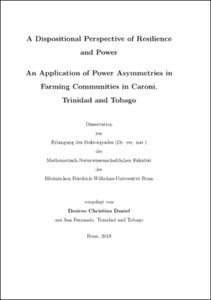A Dispositional Perspective of Resilience and PowerAn Application of Power Asymmetries in Farming Communities in Caroni, Trinidad and Tobago

A Dispositional Perspective of Resilience and Power
An Application of Power Asymmetries in Farming Communities in Caroni, Trinidad and Tobago

| dc.contributor.advisor | Speranza, Chinwe Ifejika | |
| dc.contributor.author | Daniel, Desiree Christina | |
| dc.date.accessioned | 2020-04-26T13:59:26Z | |
| dc.date.available | 2020-04-26T13:59:26Z | |
| dc.date.issued | 04.06.2019 | |
| dc.identifier.uri | https://hdl.handle.net/20.500.11811/7938 | |
| dc.description.abstract | Global change processes such as climate change and its impact on food systems, coastal communities and small island states requires us to rethink how sustainable development can be achieved in these coupled environments. As such, one of the core efforts within sustainable development goals is to build and strengthen resilience the resilience of communities and the vulnerable, thereby leaving no one behind on the pathway to development. Yet, development researchers have often criticised the suitability of resilience as an analytical concept as it masks issues that underpin the social. It is well documented by social scientists that the social structure, power asymmetries and culture shape the behaviour of actors and structure what is possible for them in their livelihoods and how they cope with change. A systems thinking of resilience can downplay the role of the social in driving change. To this end, researchers have proposed an actor-oriented perspective of resilience to draw out issues of power, drawing on concepts such as agency, capitals, knowledge, rights to conceptually bridge power and resilience. Yet, capitals, rights, knowledge are not power. This provoked the question of `what is the relation between socialecological resilience and social power?' Could the kind of entities that resilience and power are determine how they are related at a meta level and thus inform how it unfolds on the ground level? In this thesis, I set out to examine the relationship between social-ecological resilience and social power. Through an ontological analysis of resilience and power, it was deemed that both are extrinsic dispositions. This means that apart from the intrinsic properties of a material entity that give rise to these dispositions, extrinisic properties of a material entity also contribute to the possession of these dispositions. Dispositions are manifested through some processes, although they do not have to be manifested to say that they exist. Based on these categorisation and the notion that the social structure shape power and resilience, it further was postulated that resilience and power share a complementary dispositional relationship. This means that when resilience and power are co-located, they will unfold. Through a field investigation of farming communities in Caroni, Trinidad and Tobago this complementarity was explored in two cases: i) between the farmer and land and ii) between the farmer and irrigation systems. Evidence of the co-location of the dispositions are re ected in both cases thus confirming that power and resilience are complementary. Additionally, the extrinsic feature of power and resilience rests on rights. This means that rights contribute to the power and resilience dispositions of actors as rights provide access to resources. Therefore in order to discern who is being left behind or the winners of resilience approaches, a consideration of rights is needed in resilience. Lastly, the dispositional view of resilience informs that resilience manifests in actions. Thus, to analyse resilience within social-ecological systems requires not only capturing the enabling environment but also the processes through which resilience unfolds. | |
| dc.language.iso | eng | |
| dc.rights | In Copyright | |
| dc.rights.uri | http://rightsstatements.org/vocab/InC/1.0/ | |
| dc.subject | social-ecological resilience | |
| dc.subject | power | |
| dc.subject | dispositions | |
| dc.subject | ontology | |
| dc.subject.ddc | 550 Geowissenschaften | |
| dc.title | A Dispositional Perspective of Resilience and Power | |
| dc.title.alternative | An Application of Power Asymmetries in Farming Communities in Caroni, Trinidad and Tobago | |
| dc.type | Dissertation oder Habilitation | |
| dc.publisher.name | Universitäts- und Landesbibliothek Bonn | |
| dc.publisher.location | Bonn | |
| dc.rights.accessRights | openAccess | |
| dc.identifier.urn | https://nbn-resolving.org/urn:nbn:de:hbz:5n-54836 | |
| ulbbn.pubtype | Erstveröffentlichung | |
| ulbbnediss.affiliation.name | Rheinische Friedrich-Wilhelms-Universität Bonn | |
| ulbbnediss.affiliation.location | Bonn | |
| ulbbnediss.thesis.level | Dissertation | |
| ulbbnediss.dissID | 5483 | |
| ulbbnediss.date.accepted | 05.06.2018 | |
| ulbbnediss.institute | Mathematisch-Naturwissenschaftliche Fakultät : Fachgruppe Erdwissenschaften / Geographisches Institut | |
| ulbbnediss.fakultaet | Mathematisch-Naturwissenschaftliche Fakultät | |
| dc.contributor.coReferee | Mueller-Mahn, Detlef |
Files in this item
This item appears in the following Collection(s)
-
E-Dissertationen (4119)




